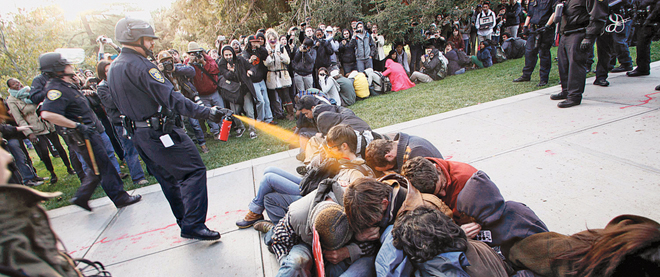Good news, bad news: Nov. 17-24, 2011
One step forward for Sidney Crosby, two steps back for Egypt
Gene J. Puskar/AP
Share
Good news

Speak freely
After avoiding section 13 of the Canadian Human Rights Act for years, the Conservatives are finally standing up in defence of free speech. In a 2009 interview with Maclean’s, Prime Minister Stephen Harper said section 13’s contentious definition of hate propaganda was “a very tricky issue.” Last week, however, Justice Minister Rob Nicholson was far clearer. He said: “Section 13 is not an appropriate or effective means for combatting hate propaganda” and urged all MPs to support a private member’s bill calling for its repeal. He specifically mentioned Maclean’s for our efforts in focusing attention on this important issue. Better late than never.
Mopping up
It will take time, but a better Libya is emerging from the horror of Moammar Gadhafi’s rule. The national transitional council’s new cabinet, unveiled this week, includes representatives from all regions and ethnic groups, soothing fears of infighting. And the recent capture of Gadhafi’s son, Saif al-Islam, and his former intelligence chief, Abdullah al-Senussi, lessens the threat posed by loyalists to the late dictator. The next hurdle will be providing the pair with the sort of fair trials that Gadhafi never would have allowed.
The Kid is back
It was the most anticipated comeback in hockey: nearly a year after sustaining a concussion that threatened to end his career, Sidney Crosby of the Pittsburgh Penguins exploded onto the ice in a home game against the New York Islanders on Monday. The brilliance of his performance—two goals and two assists—was only rivalled by the reaction of fans, who chanted his name in a thunderous anthem and waved “SID” signs like they were national flags. Their hero was back.
Sober statistics
Even one fatality from drunk driving is too many, but new data from the Traffic Injury Research Foundation reveals that Canadians are at least moving in the right direction in curbing alcohol-related deaths: the number of traffic crashes involving an intoxicated driver dropped from 1,296 in 1995 to 714 in 2009. Tolerance for dangerous driving is dwindling in other ways too: the same report shows texting while driving is a top concern among Canadians.
Bad news

Stalled spring
Just 11 months after the birth of the mass protest movement that freed Egypt of its long-time dictator Hosni Mubarak, the country is again at a dangerous crossroads. Renewed street demonstrations calling for an end to “interim” military rule have been met with force, leaving at least 29 dead and 1,750 wounded. In the aftermath, the country’s generals are promising a new constitution and presidential elections by next June, but the new boss looks an awful lot like the old one.
Some strings attached
Ottawa’s plan to buy 65 F-35 fighters from the U.S. may be even more costly than previously thought. An auditor general’s report has criticized efforts to save money on such deals by agreeing to long-term service contracts from suppliers. (Canada has set aside $9 billion to buy the jets and $7 billion for a 20-year support contract.) In addition to the deal taking away Canadian jobs, the report cited concerns about a gradual loss of technical know-how that could weaken the military’s self-sufficiency down the road. If taxpayers are asked to spend billions on the latest military technology, they should benefit from the full value of their investment.
Don’t look at me
A congressional committee tasked with reducing the ballooning U.S. deficit by $1.2 trillion failed to come up with a plan. Reports say there weren’t even any frenzied last-minute efforts. Instead, lawmakers punted the problem farther downfield—into 2013, when automatic cuts to military and domestic programs will kick in. Meanwhile, the political blame game over the failure has begun and is certain to continue for months. More evidence the U.S. system really is broken.
Too much information
The world really is getting smaller. Thanks to social media, the old rule about six degrees of separation between any two people—friends, friends of friends and so on—is now down to just 4.74 people, according to new research by Facebook. That’s less than it was three years ago, when the average was 5.28. But while services like Facebook have brought us closer together, consider: compromising photos posted online now come to the attention of your boss faster than ever.